On April 4, 2023, Kash Patel—Donald Trump’s intended pick to lead the Federal Bureau of Investigation—sent a fundraising email with a characteristically attention-grabbing subject line: “(Urgent) They are after President Trump.”
The email went on to mention Trump’s name 12 more times. It also featured an undated photograph of Trump seated in what appears to be the White House’s Situation Room, with multiple phone sets and papers strewn about the table. Trump is staring down the camera, practically scowling, while Patel stands sentry-like at Trump’s right side, his hands clasped firmly in front of him.
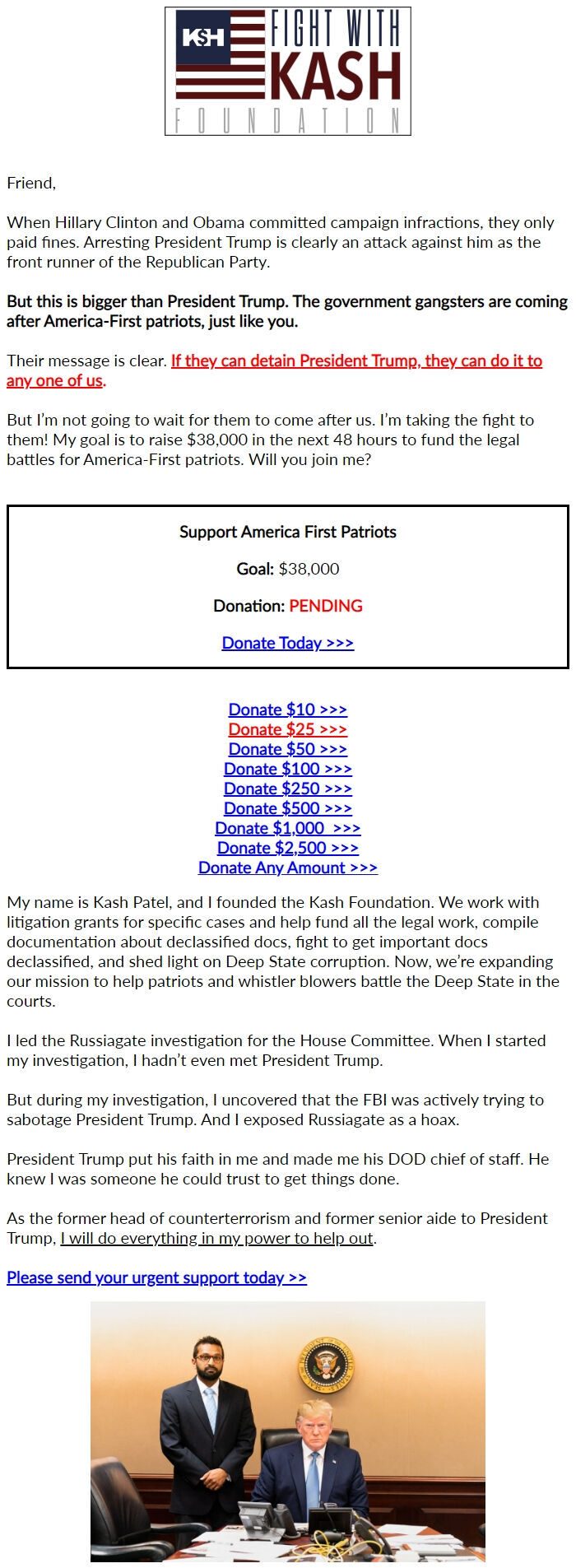
Patel introduced himself to readers of the email—which came the day Manhattan district attorney Alvin Bragg indicted Trump—as a close aide to the former president and a freedom fighter on behalf of the MAGA movement. “The government gangsters are coming after America-First patriots, just like you,” he wrote. “Their message is clear. If they can detain President Trump, they can do it to any one of us.” These “government gangsters” (the phrase is borrowed from the title of Patel’s book, published in January 2023) were trying to take down Trump and derail his presidential campaign, so Patel was asking email recipients to donate and “help me expose them to the American people.” The goal? “$38,000 in the next 48 hours.”
Prospective donors were not being asked to give money to Trump’s presidential campaign or legal defense but instead to something called the Kash Foundation, a tax-exempt organization created in 2022 with the stated mission of supporting “educational and legal efforts needed to facilitate government transparency with the goal of creating a healthier relationship between the US federal government and American citizens.” Patel’s email told readers their money would “fund the legal battles for America-First patriots.”
Between March 2023 and July 2024, almost 150 emails like this one were sent to more than a dozen right-wing fundraising networks under Patel’s name. Nearly all of them were appeals for donations to the Kash Foundation, and most included direct references to Trump. Several used the same double portrait of Trump and Patel. It’s unclear how much donor money these emails raked in for the Kash Foundation over this 16-month period, but the nonprofit raised more than $1.2 million in 2023, according to its annual tax filing. More than $212,000 of that was spent on grants to organizations or individuals, while $332,000 was spent on advertising and promotional expenses.
The Kash Foundation, of which Patel is the founder, the president, and a board member, is just a small part of Patel’s personality empire. He has published not only the aforementioned book (“A Wall Street Journal Bestseller,” the Amazon blurb trumpets) but three illustrated children’s books, each of which is a thinly veiled fantasy-world retelling of recent political events that casts Trump as “King Donald” and Patel himself as the wizard Kash, the “Distinguished Discover.” His foundation sells branded merchandise—T-shirts, hats, flags—that features his own personal logo (“K$H”) or a “Punisher”-style skull adorned with Trump’s distinctive hairdo. There’s K$H wine, K$H playing cards, and K$H insulated mugs. The proceeds, to varying degrees, go to the Kash Foundation.
Through a spokeswoman from the Kash Foundation, Patel declined to comment for this story. On Thursday, Breitbart News reported that the foundation had issued more than $1 million in grants for scholarships and legal funds. Erica Knight, the foundation’s spokeswoman, told Breitbart that “all of the funds raised have gone directly toward grant giving, and have not provided any financial benefit to Patel whatsoever.” Knight also told the news site that Patel plans to step down from the foundation if he enters government.
Among those who’ve been covering Trump for years, it’s become an article of faith that the former and future president’s loyalty has its limits. If those within his inner circle of staff, aides, and advisers appear to be doing too well for themselves or pursuing their own interests while working for Trump, there could be hell to pay.
In 2021, for instance, Trump’s attorneys sent cease-and-desist letters to the Republican National Committee, the National Republican Congressional Committee, and the National Republican Senatorial Committee over their use of his name and likeness in fundraising emails. Rep. Bob Good of Virginia got a similar letter from Trump’s campaign earlier this year demanding the Republican—who had endorsed Florida Gov. Ron DeSantis in the GOP presidential primary—remove the former president’s name from his campaign signs, since Trump had endorsed Good’s primary opponent. (The opponent, John McGuire, defeated Good and easily won the general election.) And in August, the Republican committee in Loudoun County, Virginia, received its own cease-and-desist notification from Trump campaign lawyers over merchandise depicting the GOP nominee moments after he was shot in Butler, Pennsylvania.
“It came to the Campaign’s attention that less than twenty-four hours after an assassin tried to take President Trump’s life you were using the assassination attempt to raise money,” the letter read. “Your attempt to capitalize on the assassination attempt of President Trump was in extremely poor taste.”
But there’s no reason to think Patel’s own efforts to cash in (har har) on his proximity to Trump will threaten his intended nomination or standing with the incoming president. The rise of Patel as a MAGAworld celebrity has been no secret, and it coincided with his own elevation within Trump’s cadre of trusted allies. Patel became a regular presence on the campaign trail in the final months of the race, and when I saw him at a Las Vegas Trump rally in late October, the response from an arena full of Trump supporters was deafening. There’s no doubt about it: Patel is a star.
More importantly, Patel’s persona—a fast-talking, confident, hard-charging assailant against the “Deep State” and a government that has been “weaponized” against Trump—insulates him from any perceptions that he’s been diverting money, attention, or money away from the president-elect. Put simply, Patel delivers exactly what Trump wants from him.
The recent controversy surrounding Boris Epshteyn, the close Trump confidant and coordinator of his legal effort, is another example of the same phenomenon. Last Monday, the New York Times reported on an investigation into Epshsteyn conducted by Trump attorney David Warrington, focused on whether the aide had been seeking “retainer fees from potential appointees in order to promote them for jobs in the new administration.” The final report concluded, per the Times, that Epshsteyn “had sought payment from two people,” and that he should not remain in Trump’s inner circle. Epshsteyn called the claims “false and defamatory,” and Steven Cheung, the incoming White House communications director, told the Times the transition is “moving ahead together.”
The saga seemed to result in little to no fallout within Trump’s inner circle until Wednesday, when Trump announced that Warrington would be replacing his original selection for White House counsel, Bill McGinley. McGinley, meanwhile—whom Trump had previously tapped for the job partially on Epshsteyn’s recommendation—would be shifted over to the Department of Government Efficiency (DOGE), serving as counsel to the bespoke government cost-cutting office headed by Elon Musk and Vivek Ramaswamy.
Was Warrington being rewarded? McGinley and, by extension, Epshsteyn, being punished? The White House counsel position is a plum appointment, of course, and one that comes with close proximity to the president, but the assumption of many in Trumpworld is that DOGE will be a locus of power and activity. The message of this week’s switcheroo, therefore, is difficult to discern. All we know for sure is that, when it comes to Trump, nothing is ever settled for long.
In talking with people who understand how Trump operates his pit of vipers, however, it’s clear that Epshsteyn’s stock with the president-elect has not suffered over the “pay-for-play” allegations. In fact, the opposite seems to be true, thanks to his work leading a legal team that can declare all-but-total victory.
As with Kash Patel, what matters more than the perception of grift for Trump is the answer to the most important question: How hard are you willing to fight for the Big Guy?
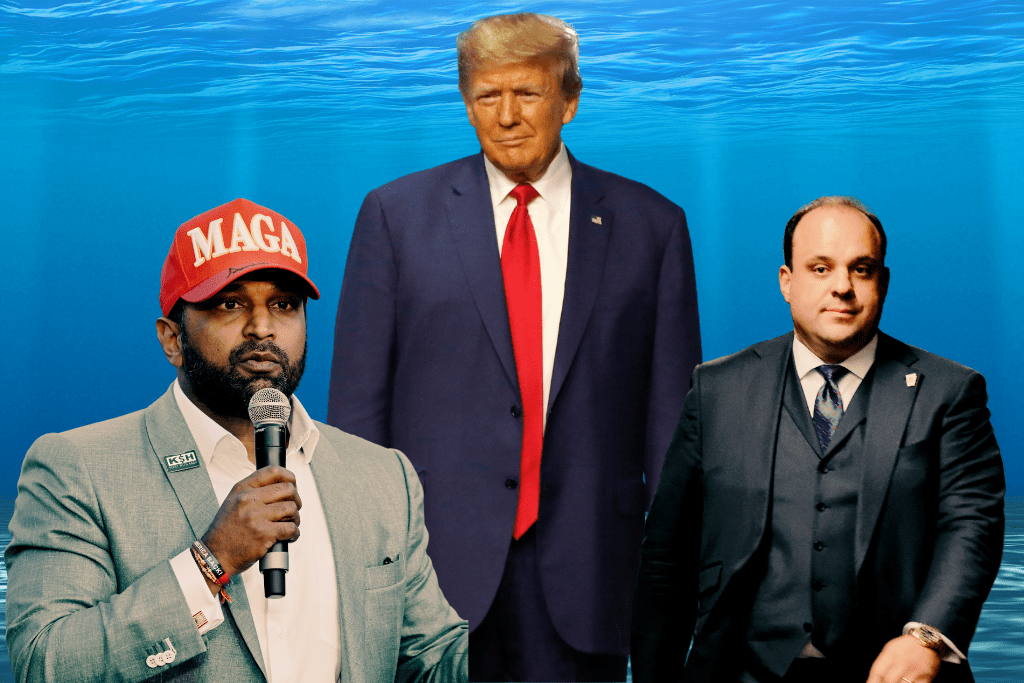

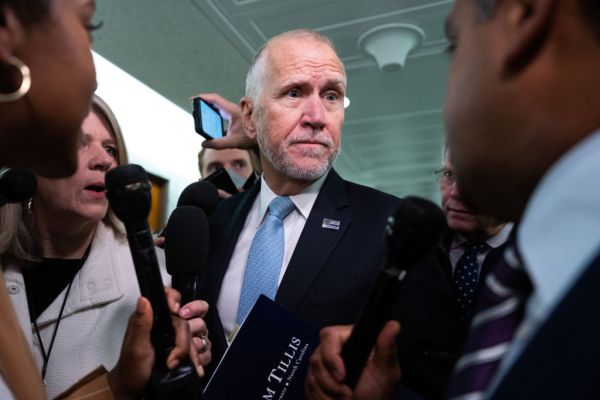
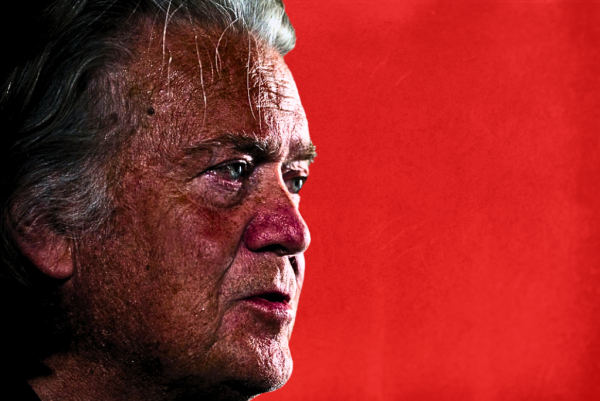
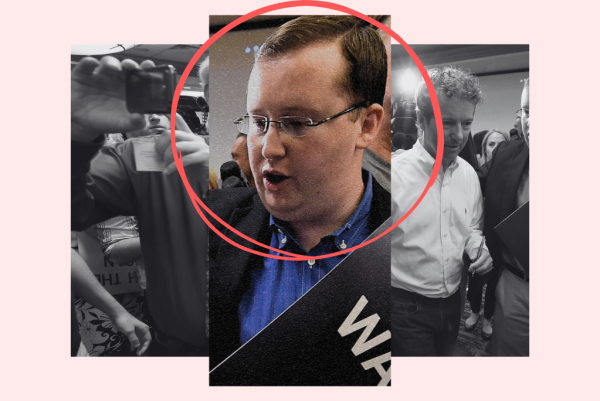

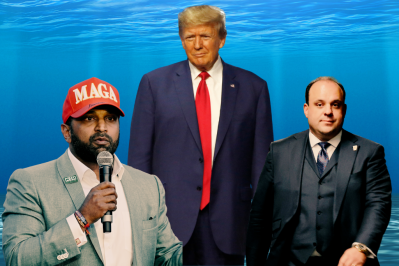
Please note that we at The Dispatch hold ourselves, our work, and our commenters to a higher standard than other places on the internet. We welcome comments that foster genuine debate or discussion—including comments critical of us or our work—but responses that include ad hominem attacks on fellow Dispatch members or are intended to stoke fear and anger may be moderated.
With your membership, you only have the ability to comment on The Morning Dispatch articles. Consider upgrading to join the conversation everywhere.